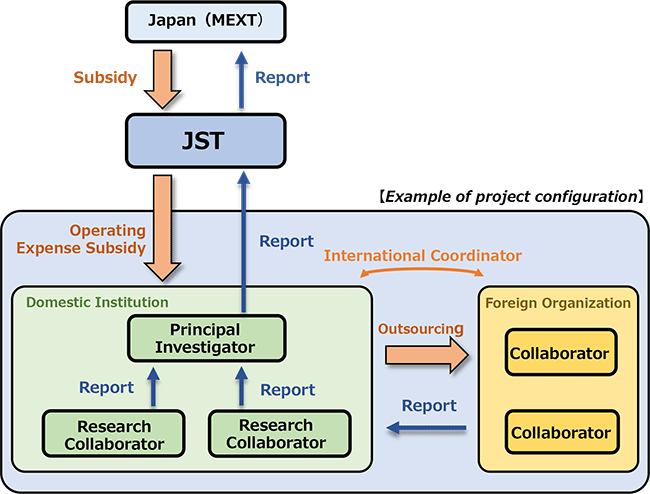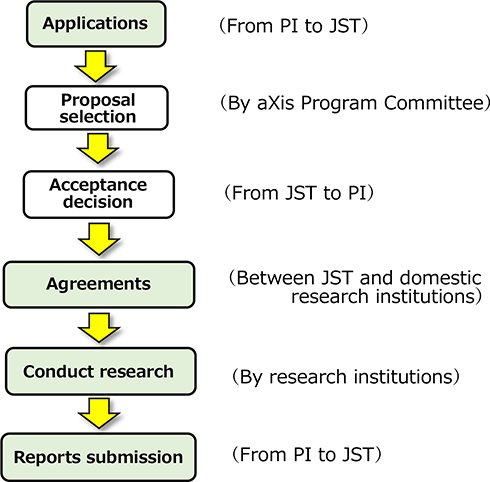About
"Accelerating Social Implementation for SDGs Achievement (aXis)"
Objective of aXis
The program Accelerating Social Implementation for the Sustainable Development Goals (SDGs※1) Achievement (hereinafter referred to as “aXis”) contributes to the progress of the SDGs in developing countries by utilizing Japan's science, technology and innovation, and promoting overseas dissemination of research results. Developing countries are also attracting attention as sources of innovation, and efforts will be made to tackle their social challenges while establishing good cooperative relationships between them and Japan.
General Description of aXis
(1) Background
Aiming to accelerate SDGs progress in developing countries, aXis will help overcome the barriers posed by regulations and social acceptance in Japan by promoting on-site verification tests and other steps to facilitate the social implementation※2 of research results. In carrying out verification tests, etc., we aim to alleviate the barriers to implementation via human resources who will be responsible for coordination with the government and stakeholders of the partner country.
(2) Policy status
Japan's Fifth Science and Technology Basic Plan (approved by the Japanese Cabinet in January 2016) states that Japan will proactively leverage its science and technology potential to help combat global issues, including climate change, biodiversity loss, food and water resource issues, and infectious diseases, and improve the quality of life in developing countries, in order to actively contribute to the sustainable development of the world.
To this end, Japan needs to cooperate with universities, public research institutions, the business community, as well as other countries and international organizations to carry out R&D to find solutions to global issues. In addition, it needs to promote a wider application and adoption of research outcomes in and outside of Japan, and take a lead in achieving an international consensus. At the United Nations Sustainable Development Summit held in September 2015, the outcome document “Transforming our world: the 2030 Agenda for Sustainable Development” with “the SDGs” as a core component was adopted as a new and more comprehensive world action agenda for people, planet and prosperity. In addition to this, JST intends to promote STI for SDGs in developing countries and to actively respond to SDGs and contribute to the international community.
In the Integrated Innovation Strategy 2019 (approved by the Japanese Cabinet in June 2019), “Promotion of science and technology innovation to achieve SDGs (STI for SDGs)” is a specific focus. It states that the international promotion of local intellectual assets such as Japan's STI seeds will contribute to the achievement of the SDGs. Based on this, aXis intends to promote STI for SDGs in developing countries and to actively respond to SDGs and contribute to the international community.
In scientific and technological cooperation with emerging and developing countries, it is important to break away from the aid-driven forms of cooperation that have prevailed up to now, and move instead towards strategically establishing frameworks for more equitable partnerships with such countries in order to facilitate socially inclusive and sustainable innovation (“inclusive innovation※3”). It is also important to strengthen international professional networks.
Therefore, in our science and technology cooperation with emerging and developing countries, Japan needs to develop systems to promote inclusive innovation by pursuing collaborations with the counterpart country’s government, universities, public research institutions, funding bodies, and companies, and help to foster young researchers and industry professionals in the country.
Additionally, the Basic Plan presents that to reinforce the foundation of science and technology innovations, Japan will train and secure highly trained personnel who will generate new knowledge and values, and a diversified workforce that will accelerate the creation of innovation. At the same time, Japan will create environments that enable each and every individual to maximize his or her contributions in the most appropriate settings, according to their own capabilities and motivations. It is expected that international joint research projects will also lead to fostering Japanese talents tailored to globalization.
Industry-academia-government partnerships are critical for implementing the Basic Plan. The Basic Plan states that to advance science and technology innovations effectively, the key elements are fleshing out initiatives aimed at strengthening the functions of the diverse implementers of science and technology innovation activities, such as universities, public research institutions, and companies, and expanding industry-academia-government partnerships.
(3) Structure of aXis
For the program, as shown in Figure 1, Japan Science and Technology Agency (JST) received a subsidy from the Ministry of Education, Culture, Sports, Science and Technology (MEXT) to accelerate SDGs achievement in developing countries.
JST will support Japanese research institutes aiming to promote social implementation of Japan’s research results by conducting on-site verification tests of technologies beyond the lab scale study. It aims to alleviate barriers to implementation by establishing a system of human resources (hereinafter referred to as “International Coordinators”※4) who are responsible for coordinating with the governments and stakeholders of partner countries during the implementation of verification tests, and promoting the overseas dissemination of research achievements.

Fig. 1 Implementation Structure of aXis
(i) Program Director and Program Officer
JST assigns a Program Director (PD) to coordinate management of the entire program and Program Officers (POs) to coordinate research promotion in specific fields.
- Program Director(PD)
- The Program Director has overall responsibility for management of the aXis program. He or she makes policy decisions on the overall thrust of the program, coordinates the different research fields and areas, decides on project selection and chairs the program committee that deliberates on important matters concerning research project management. The program committee consists of the Program Director, Program Officers, and external experts.
- Program Officer(PO)
- Each of the Program Officers has overall responsibility for research in a specific research field. He or she joins external experts on the screening committee, acting as either the chair or a member of the committee. The screening committee is a subcommittee of the program committee, and it decides on candidates for aXis projects. After projects have been approved, the Program Officer handles the research management for his or her research field by coordinating the research plans of the individual research projects (including plans concerning research expenses and composition of the research team), exchanging ideas and views with principal investigators, giving advice concerning the research, conducting project evaluations, and by other means as necessary.
The Program Officer also gives advice to the collaborating country’s researchers.
JST holds open calls for proposals for researchers belonging to universities and research institutes in Japan, and selects research subjects by an evaluation committee consisting of Program Officers and external experts. When applying to one of JSTs calls for proposals, the Principal Investigator (PI) should carefully coordinate with research collaborators, collaborators of the foreign organization and other stakeholders such as relevant ministries and agencies.
(ii) Adoption of research subjects in JST
Figure 2 shows JST’s research topic selection and implementation process.

Fig. 2 Flow from selection to completion
(iii) Implementation of the project
In carrying out research, the Principal Investigator (PI) and the research collaborators will be required to carry out activities based on a contract with JST. The PI will be responsible for the overall performance of the research project and project management.
- ※1
- SDGs : Sustainable Development Goals
- ※2
- Social implementation: Return specific research results to society. New knowledge and technology obtained as a result of research will bring benefits to society and the economy by being commercialized in the future and disseminated in the market or reflected in administrative services.
- ※3
- Inclusive innovation: In aXis, this refers to innovation that focuses on the potential of developing countries and includes people from those countries in the innovation process.
- ※4
- International Coordinator: Responsible for sending Japanese researchers overseas and accepting foreign researchers, through activities such as administrative exchanges with the government of the host country, liaison and coordination for local procurement of equipment, etc. Although they do not engage in research activities themselves, as members of the Japan-side research teams with researchers and collaborators of their research institute, they work with research representatives and other members in order to carry out tasks smoothly and effectively. The Principal Investigator can also serve as the international coordinator.


